Overview
In the App Designer editor, the List Collection control allows you to represent information contained in the forms of a collection by means of a list, arranging the information in an organized and appealing way, also including an option to execute user-specified actions.
Adding the control to your page
To add the List Collection control to your apps page, open the Controls menu (located at the top left corner of the screen) by clicking it. Then, look for the Collections control, and click the arrow icon to open a drop-down list that allows you to visualize the different options in the form of collections. Scroll down until you find the List Collection control and drag it to your page.

Once you have done this, the control appears on your page as follows:
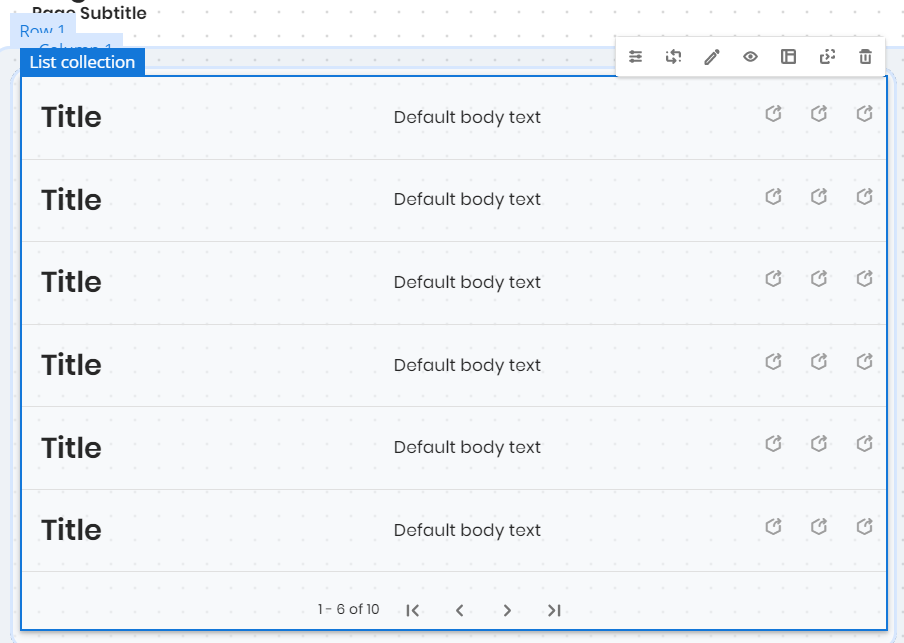
Managing the control content
With the control already added to your app, you can manage the content to be displayed on it. To do this,click the control to display the configuration options. Select the Manage Content option to add data to the control.
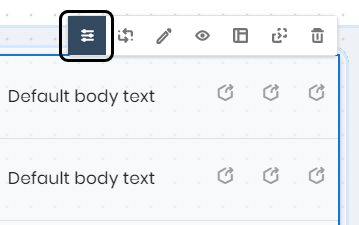
There are two types of content when adding data to a collections control: Static content (fixed content that does not change over time) and Dynamic content (content that comes from a data fetch of the Persona's Views, My Stuff, or Cases).
Static content
When adding Static content (i.e., when you click the Fixed tab in the Manage Content window that appears), notice that there is an item option called List Collection with two editable fields related to the content displayed on each list item:
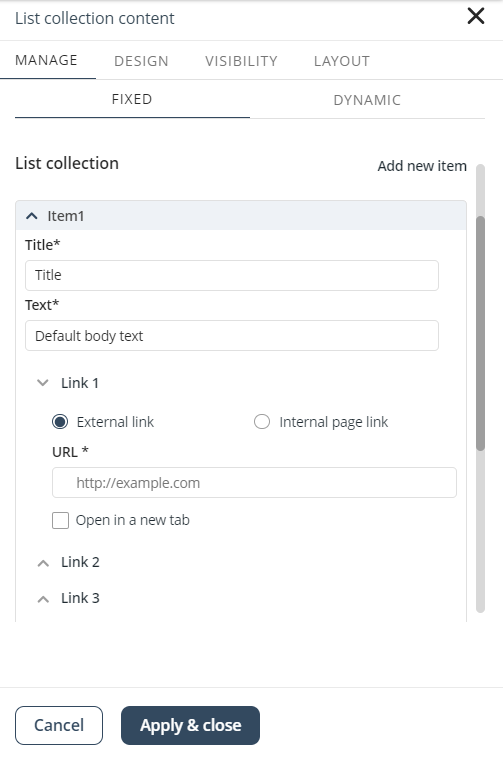
1.Title: As its name indicates, this field corresponds to the title of the list item. The title is always shown on the left side of the item.
2.Text: In this field you must give a brief explanation of the title displayed in the list item. The description you provide in this field is always shown next to the title.
3.Link: In this section you can add either an external link or an internal page link to enable navigation through the app. You can also enable the Open in a new tab checkbox option.
|
When adding static content, bear in mind that all the available options for the Collection controls are also available for the List Collection control. To review these options, refer to Static content. |
Dynamic content
As mentioned before, you can add content that comes from a data fetch of the Persona's Views, My Stuff, or Cases to any Collections control. To configure Dynamic content, go through the steps of the Connection Wizard (detailed in Dynamic content). Once you are done configuring the data, notice that the control displays labels indicating the data mapping, as well as the data source (in this case, a Collection named Equipment) at the bottom right corner. These labels indicate that the control has been set up with dynamic data.
In the example below, you can see how the List Collection control looks like when adding dynamic content.
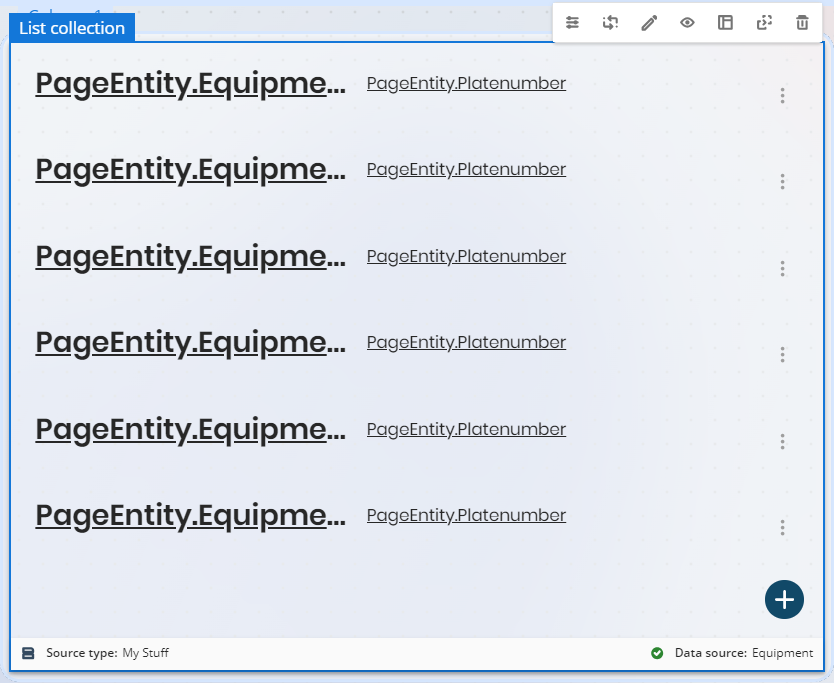
Events as Actions
Events as actions allows you to access the events related to an entity, once your app is published from a Collection with dynamic data, in the same way that actions are accessed from a view with dynamic data.
To access events from collections, click the three-dot menu in the collection item. This displays a drop-down menu with all the events related to the entity. Click the option that has the name of the event you need.
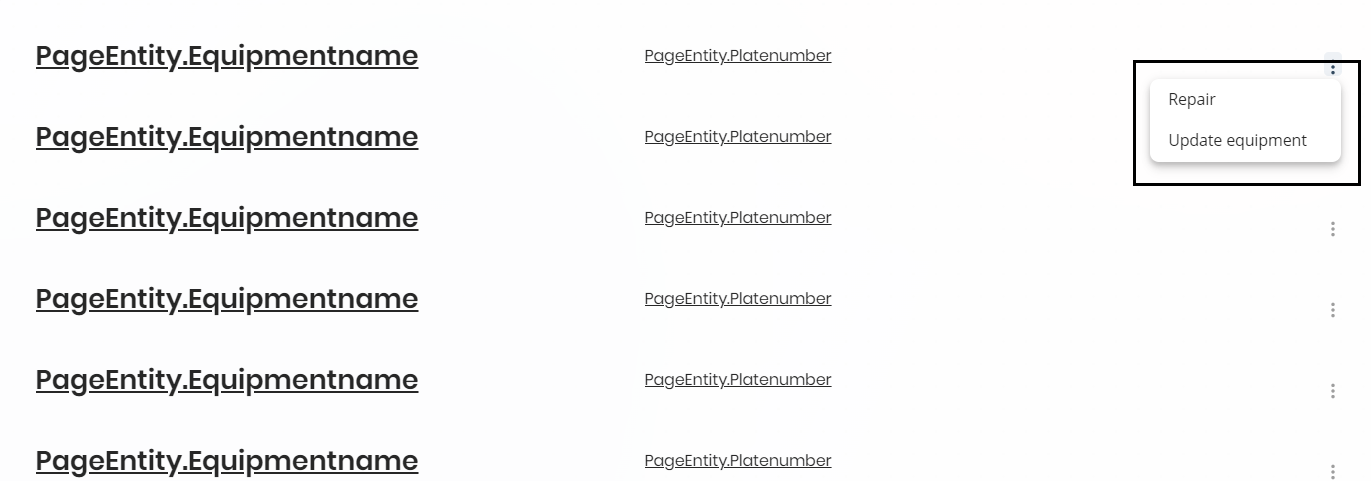
Activities as Actions
Users can visualize and execute the pending activities of a process from the three dot menu in an item of a collection or in a Detail Page. This visualization of the activities allows users to execute them more easily and faster without any configuration needed.
There are two ways to visualize the collection of pending activities:
1.Once you have published your app in the App Designer editor enter a page where a collection has been configured.
a.Select one item from the collection and click the action menu. This will display the list of the pending actions in this example there are three pending activities: Start Loan, Approve Loan, Validate Loan, Cancel Loan, and Update Loan. To execute an activity, simply select it and a case will be generated.
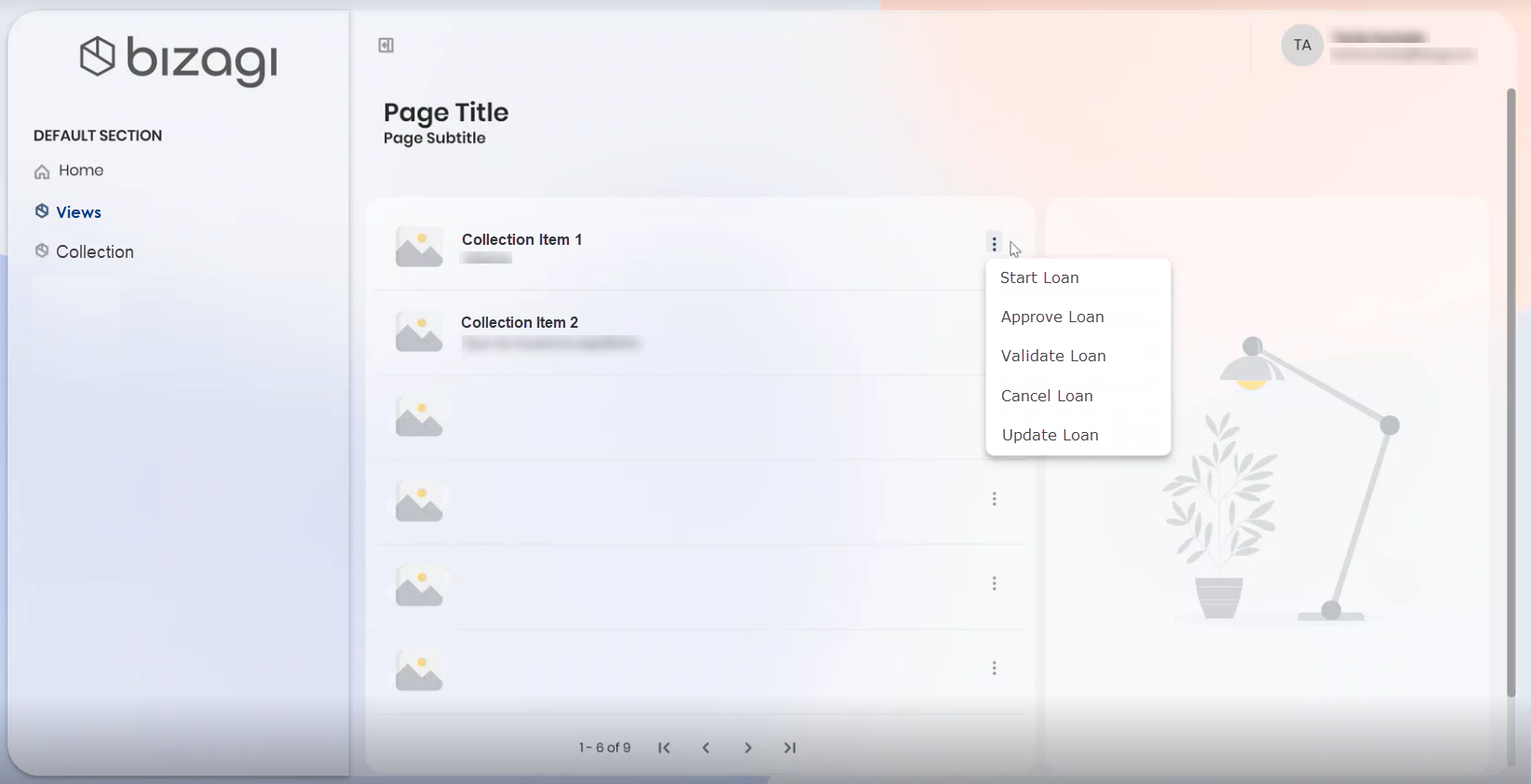
2.Once you have published your app in the App Designer editor enter a Detail page previously created.
a.In this case, we will access a Detail page from a Small Card collection. Inside the Detail page, you can visualize three buttons associated with the same pending activities as actions: Start Loan, Approve Loan, Validate Loan, Cancel Loan, and Update Loan. To execute an activity, simply select it and a case will be generated.
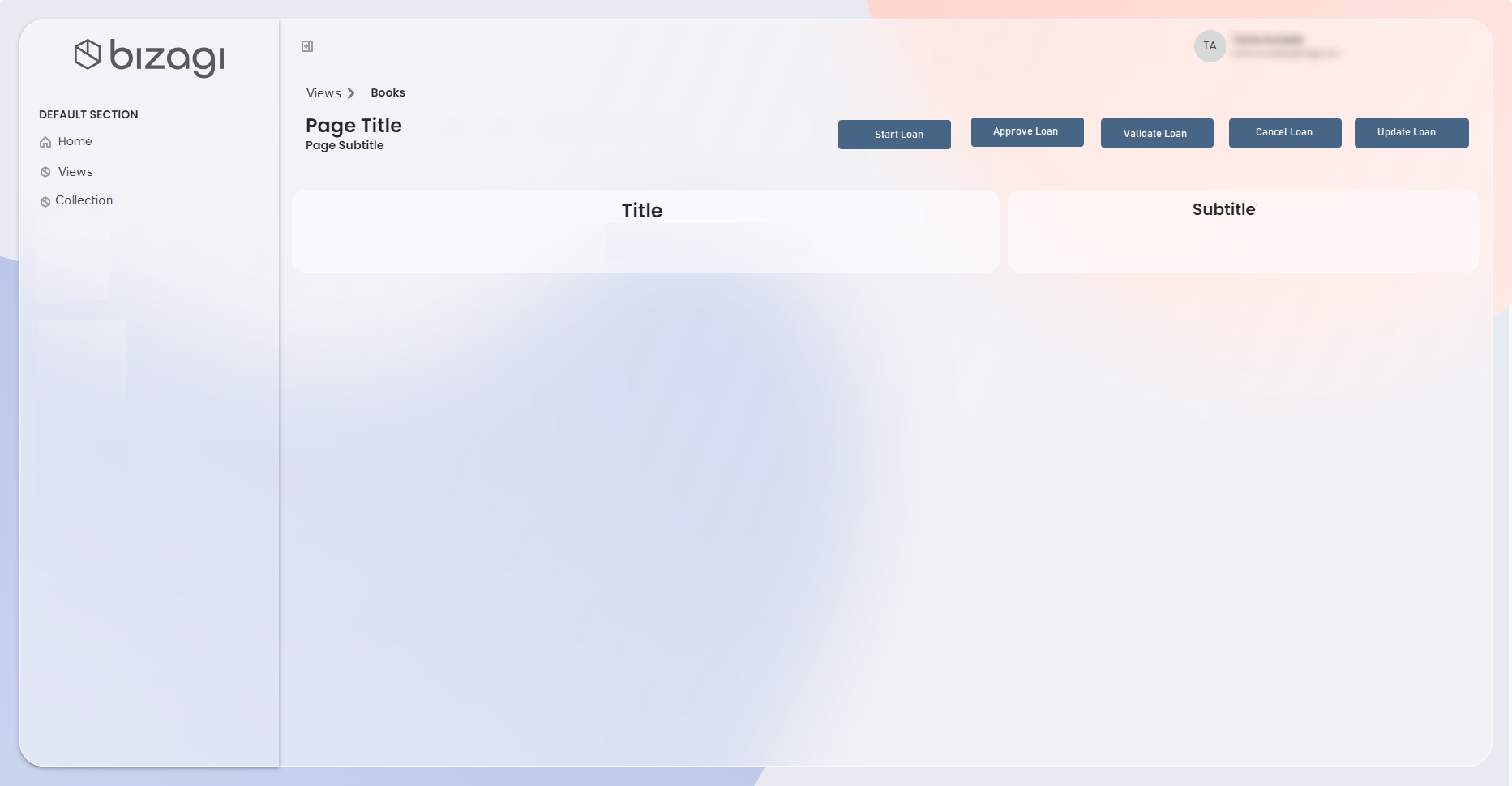
New Record configuration
The App Designer has a New Record button in the List Collection collection. Click the ![]() button to open a form to add a new record.
button to open a form to add a new record.
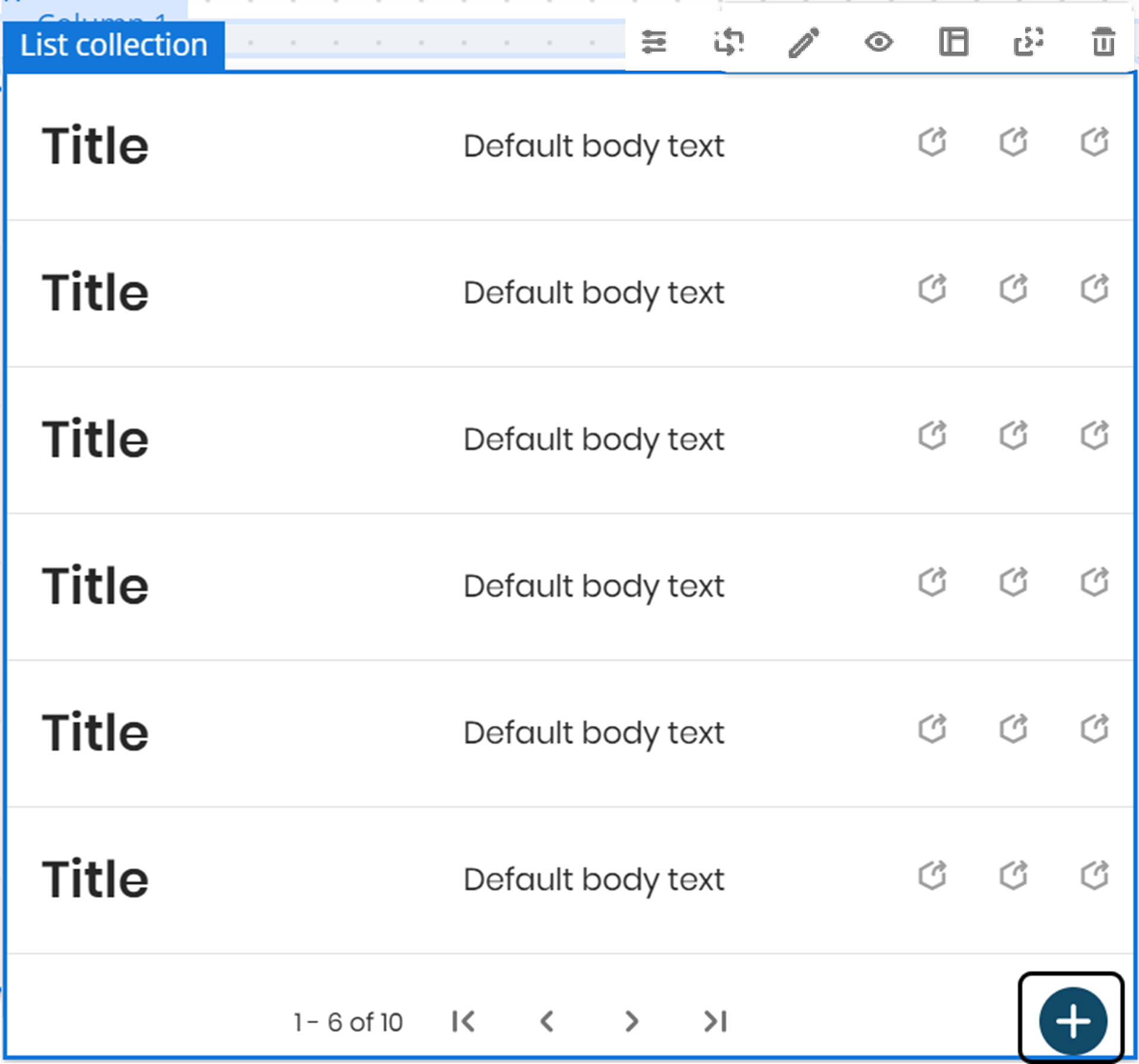
Defining the control appearance
You can also change the control's look and feel by adjusting its settings and layout.
Adjusting the control settings
To adjust the control settings, hover on the control to display the configuration options and select the Settings option.
|
•Click the Reset button to restore the default settings. •Properties with inherited values display a blue dot next to their title. This indicator allows you to make targeted adjustments without affecting other settings. Hover over the blue dot to see the source of the inherited value, giving you greater control over your text control’s appearance. When you modify a property marked with a blue dot, its individual Reset button appears. Clicking this button restores the property to its default inherited configuration. |
Pointedly, you can modify three control settings:
1.Style: In this setting you can define the following options.
•Align: Align the text to the left, center or right side of the control.
•Displayed items: Set the number of list items that the control displays.
•Control width: Define the percentage of the column width for the control.
2.Fonts: In this setting, you can modify the following options.
•Font family: Allows you to define the font family for the text inside the list items. The font by default is Poppins Regular.
•Font size: Lets you set the size (in pixels) of the text inside the list items.
|
Bear in mind that the settings defined in Fonts apply to both the Title and Text fields. |
3.Colors: In this setting, you can set the color for the font, background, border, and icon inside the control
•Font color: Lets you set the color of the text inside the list items. When you click the first square of the option, a color picker palette opens for you to select the text color you want. Likewise, you can select the color by specifying its hex color code in the Hex field.
•Background color: Lets you select the color for the background of the control.
•Border color: Lets you set the color of the border between collection elements.
•Icon color: If your collection has any icons added, you can modify the Icon color to have the same color selection options as the Font color setting.
When you group the content of your control using the Group by option, or you configure actions in your control, you can define two more colors:
•Active group button color: background color of the active group button. The active group is the value of the category currently used to filter the dynamic content.
•Action button color: background color of the buttons that execute Events or Activities configured as Actions in the control.
|
For more information on how to add an icon to the List Collection control, review the Links option described in Static content. |
Visibility options
In this section of the menu, you can configure who can visualize the control, by selecting the Personas. You can enable the All option to select all Personas, or you can select the Personas you want to have access to the control.
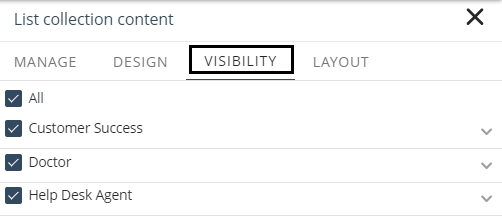
Adjusting the control layout
Finally, you can adjust the control layout. To do so, hover over the control to display the configuration options and select the Layout option. This option allows you to define the list items arrangement and distribution by modifying two different settings:
1.Distribution: Define whether the text is going to be positioned to the left (Basic left option) or right (Basic right option) side inside the list item.
2.Display items: Set the number of list items that the control displays. It is the same setting that appears in the Style setting.
Last Updated 11/19/2025 12:00:43 AM